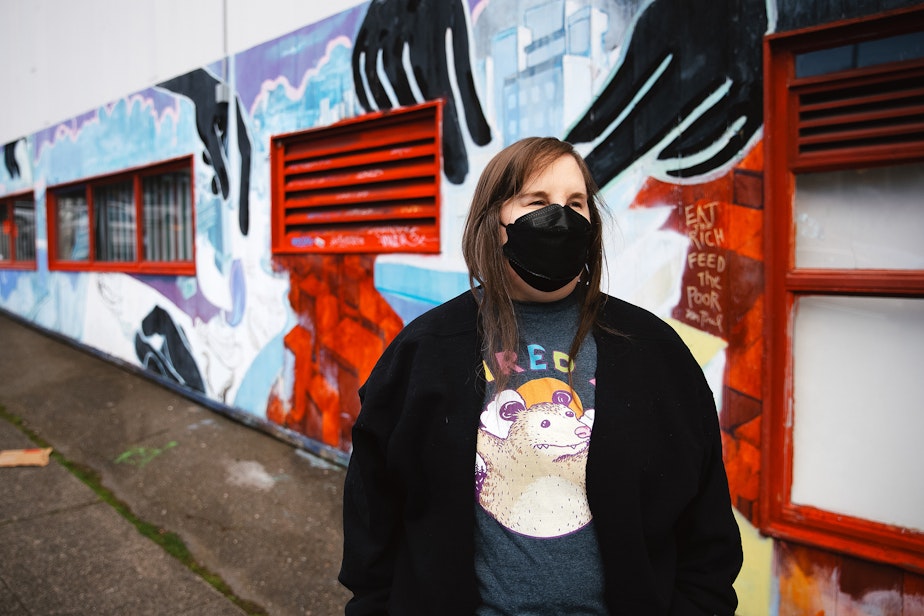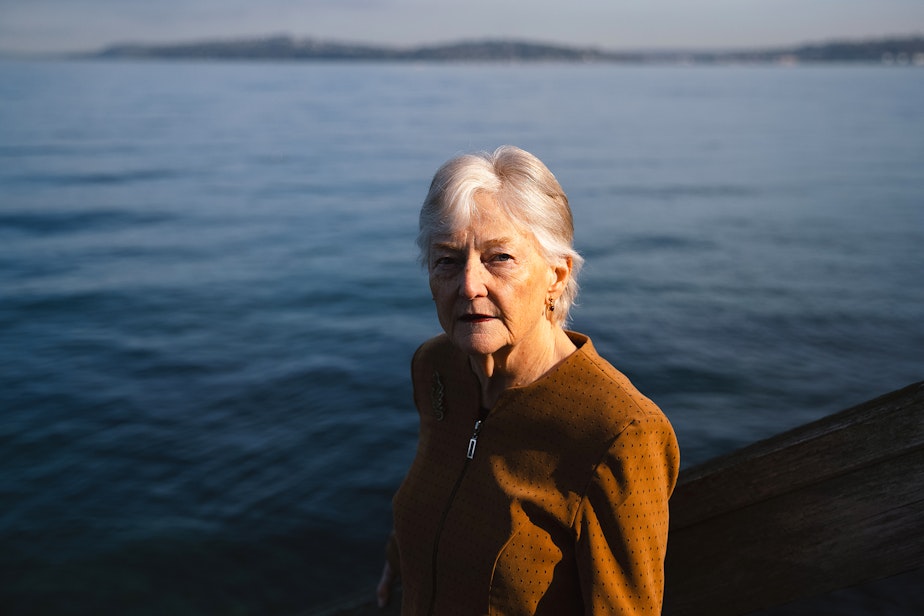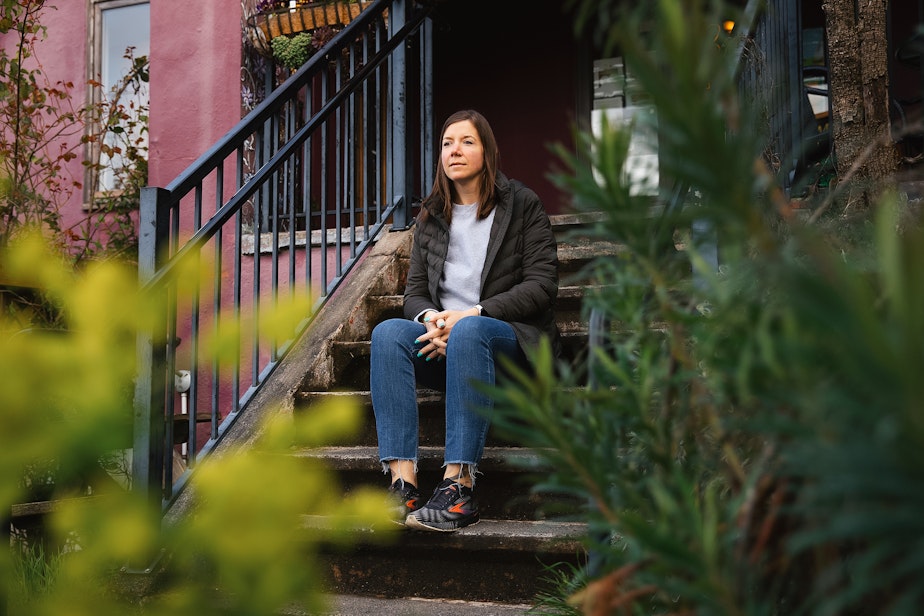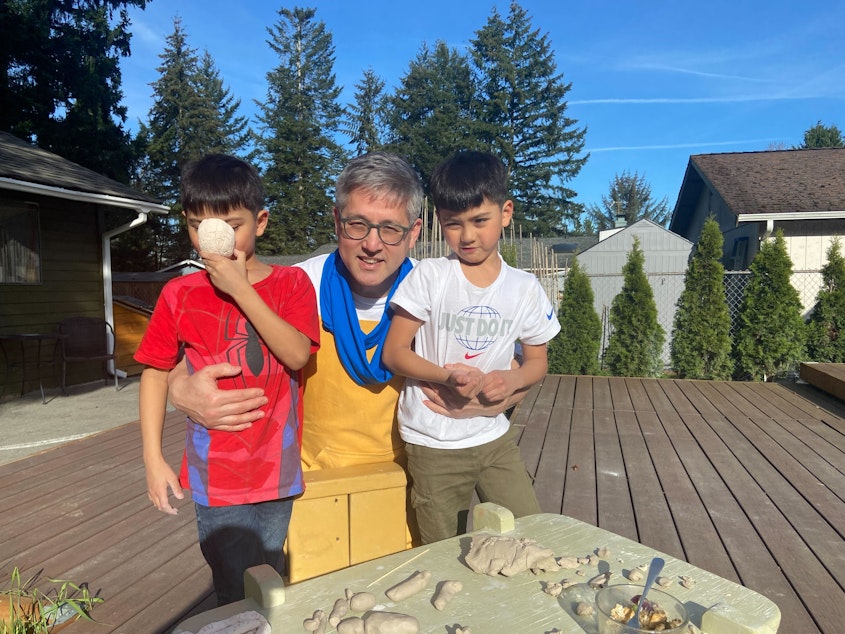Voices of the pandemic – 5 years later

Five years ago, Washington found itself at the leading edge of a once-in-a-century pandemic. Things now might appear to be back to normal, but scratch the surface and you'll find changes large and small to our health, our work, and our communities.
Around this time in 2021, KUOW collected stories from across the region for our "Voices of the Pandemic" series. We've reached back out to some of those folks again, and some new voices too, and we're sharing their reflections on their post pandemic lives.
The following stories have been edited for length and clarity. You can listen to the full stories by clicking the play button at the top of the page.

Sponsored
When I heard about the outbreak in the nursing home, I was coming back from a meeting in Washington D.C., and we were talking about the pandemic because the Everett case had already happened.
Most of the rest of the country was so focused on airports, and I will always recall leaning over to one of my colleagues from the West Coast, and I said "you know, I think we're spending too much time thinking about airports and not thinking about other places."
I think we want to get back to normal. So I think a lot of what we're seeing is that hunger to get things back to the way it "was", when actually it never really can go back. I like in that space a lot, think about it a lot, and I think that the attack on science and misinformation is ballooning right now, which will be a challenge for generations to come. That is not a problem that's going to be solved quickly.

Sponsored
What bubbles up for me when I think back to the start of the pandemic, even just saying this, I can feel my hands get sweaty. I can feel the tightness in my chest of thinking back. It felt so fast, it felt out of control. It felt scary. Just everything felt like you were jumping into the middle of rapids and you had no idea how it was going to end or how you're going to get off of that.
Sponsored
Do I carry invisible trauma? Absolutely. There used to be songs we would play when somebody graduated from the ICU and went to the floor. And if I hear a couple of those songs, it's like, I immediately turn it off, like I don't like the way it makes me feel. It just brings me back to a hard time. “Girls Just Want to Have Fun” — I can tell you that everybody got to choose their song when they were leaving, and so it was one particular day that this patient played that song, and we would play it in the hallways as people were leaving. For some reason that song takes me right back to all of those very uncomfortable feelings.

Desiraye Aylesworth, owner of Wild Mountain Café
I found out about the closure, I'm fairly certain, just from social media and the news. I remember Governor Inslee was giving updates. It's not like I got a phone call or an email from anybody. It was just kind of evident that everything was closed. The community support that we have, the regulars that have been coming here for years, like we could not have made it without them. And every time I think about it, I get emotional and teary-eyed, because there's a lot of places that didn't make it. Huge places that you would have thought would have never gone under and they did for one reason or another.
It definitely changed the way I see the role of our restaurant. Because, I mean, as far as a career goes, other people in my family have these, you know, “big girl jobs” and I was like, “Well, I just work at a restaurant,” but it's true that places like this can have impact on other people's lives. And it's evident that it has [for] so many people in our community for one reason or another.
Sponsored

Bryan Ohno, ceramic pottery artist and grandfather
When KUOW last spoke to Bryan in 2021, he was juggling raising his identical twin grandbabies, and his love of making art.
When I retired from the gallery business, I thought it would be a time where I would go back to my original passion, which was ceramics. And I thought I'd be making a lot of stuff for myself, artistic pieces. Then the pandemic happened, and then the kids came along, and it just dawned on me even more so that it's all about the next generation. I'm 63 years old, so it’s an era in which we think about passing along to the next generation. What can I do, what can I share, and what can I teach?
[The boys] don’t live with me anymore because they’re in first grade, going to elementary school. They are very important to me. We don't even have to talk, and we kind of connect. One of the things we spend a lot of time [with] is we're cooking together. So I'll have them peel the carrots, show them how to cut it. If I didn't have that close connection, I don't think we'd be able to do those kind of things so easily.
Sponsored

Dr. Reverend Kelle Brown, senior pastor at Plymouth United Church of Christ
Being a pastor of a church in the Pacific Northwest where people say people don't go to church and people don't need to gather in that way, one of the things that I found during the pandemic is that people do crave all the same things that we've always craved. We want a place where we can come and be embraced and not judged, and to be known and to know other people. So I learned, even if it's in a coffee shop, if it's at the park, if it's during a conference or a workshop or some kind of gathering, it's all church.
When we last spoke, I spoke about grief, and today I feel I'm probably in the same place of knowing that there are so many who are listening [and] are dealing with grief in so many ways. Loss of people, for sure, but there is a loss of who we were, a loss of who we thought we could be.
I would invite us to be taught by the grief so that we can go into it and to push through to the other side. Because if we don't allow ourselves that process, grief can take us to a place where we won't have the ability to be thoughtful, to be strategic, to be analytical, or to even know who to listen to or how to be together.
Sponsored

Roz Martinez
I have rheumatoid arthritis, so I take immune suppressants every day, and at the point where Covid came out, I was taking one that completely wipes out your B cells. I go in and get massive doses of steroids and just be wiped out for a couple of weeks.
Just before we went into lockdown, I was just getting back on my feet, and I decided to go to the movies with my friend Jessica. I remember, like, hugging her and just being like, “Oh, I can't wait to see you again next time, it's gonna be so great." And then I went home, and within a week, we decided that that was it, like Seattle Public Schools kind of shut everything down, and it was like, “Wow, we're really in it.” We've been basically isolated since then.
When people started to kind of get back to “real life,” I started seeing on social media, friends going to concerts, going to bars, and just masses of people together, just wall-to-wall, people at concerts. And it's very conflicting, because I'm very happy for everybody, but at the same time, there's a large group of us who have kind of been left behind, and it kind of felt like at the beginning of the pandemic, we were all in this together. We're going to take care of each other, I'm going to mask, you're going to mask. And then once people had vaccines, they were kind of like, “Well, that's over with.”
Sponsored
I finally did get to see my friend Jessica after five years. She took a Covid test, and then she came over, and we actually played "Dungeons & Dragons." It was really moving to see her again after so long.
Josh Small, father of two and Boeing employee
I never really had a specific career in mind that I loved, except maybe when I was younger, I wanted to be a professional basketball player. But besides that, I always just wanted to be a dad, and I always looked forward to having kids of my own.
My kids were born in 2014 and 2016 and up until 2020 I was working mostly from the office up in the Renton and then Boeing Field areas, which is quite a commute. [Before Covid] I would wake up around 4 a.m. and drive over to this park and ride and try to be there shortly after 4:30 a.m. [and] either hop on a van pool or a car pool, depending on my schedule for the day. [I’d] arrive at work by 5:30 a.m., get back on the van or carpool between 2-2:30 p.m.
Obviously there have been lots of downsides that have come from Covid, and I'm not trying to put anything on that, but for me, the greatest shift has been that over these last five years, the time that I've been able to have with my kids and with my family has been way more than it would have possibly been if I was still working from the office four to five days a week.
Suzanne Wheeler, experiences long Covid
[Covid] felt like constant asthma, where you have that tightness in your chest, and especially if you're sensitive to cold, where you just kind of feel like everything's frozen. The fatigue, the brain fog, there was a comedian once that said, you know, germs get in your body and they throw a party. Well, this was like, every germ in my body threw a party and wore me so out. I just couldn't even human.
On a what I would consider a down day where I really can't get out of bed much, I am listening to music. I love my public library to listen to audio books. They have saved my life several times over. If I'm doing OK with screens, I can read. If I'm doing a little bit better with energy, I can listen to an audio book and crochet.
I pay a high price for anything that I do. I do like to volunteer. I like to volunteer for festivals. And what I would have to do is rest for two days ahead of time and then make sure I rest two to three days after and that's how I make it work. I do try to approach everything, you know, of course, with a brighter light and a sense of humor. It does get dark sometimes, though. There were several times where I've had insomnia because I was afraid if I went to sleep, I would not wake up. And I still want to be here.
Special thanks to Jason Pagano, Megan Farmer, Liz Brazile, Joshua McNichols, and Ruby de Luna.





